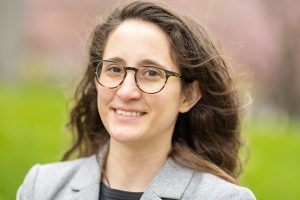By Wayne Gillam | UW ECE News

UW ECE Assistant Professor Sara Mouradian (above) has been awarded a three-year grant from the Air Force Office of Scientific Research, or AFOSR, through its Young Investigator Program, or YIP. The grant will support work in Mouradian’s Scalable Quantum Research Lab, which aims to build, understand and control trapped ion quantum systems in order to develop useful and practical quantum technologies. Photo by Ryan Hoover | UW ECE
UW ECE Assistant Professor Sara Mouradian has been awarded a three-year grant from the Air Force Office of Scientific Research, or AFOSR, through its Young Investigator Program, or YIP. The grant will support work in Mouradian’s Scalable Quantum Research Lab, which aims to build, understand and control trapped ion quantum systems in order to develop useful and practical quantum technologies. Mouradian joins an elite group of investigators as one of only 48 scientists and engineers from across the nation that have been awarded a 2024 AFOSR YIP grant. These individuals have each demonstrated exceptional ability and promise for conducting basic research relevant to the U.S. Air Force and national defense.
“It’s an honor to receive this award and be part of such a prestigious group of talented investigators,” said Mouradian, who also is a member of the Institute for Nano-Engineered Systems and QuantumX at the UW. “It’s very exciting for both me and my students to know that our work is valued by the AFOSR and by the community.”
Quantum computing and related technologies promise significant breakthroughs in sensing, communication, and computation along with exponential increases in speed for solving complex problems, with potential impact in areas such as pharmaceutical development, materials science, and cryptography. Quantum technologies also could fundamentally change the defense sector, providing new modes for secure communication and computational advantage. However, scientists and engineers still face many challenges before they can build a fault-tolerant computational architecture, which is required for quantum systems to be capable of solving real-world problems. Mouradian’s work is anticipated to strengthen AFOSR Quantum Information Sciences programs by building a foundation for future research into fault-tolerant quantum computation based on trapped ions.
The AFOSR YIP grant will enable us to investigate using optical forces and long ion chains for quantum computing, and I believe that there will be many more future applications for the technology we are developing. — UW ECE Assistant Professor Sara Mouradian
Trapped ion quantum systems are considered by many, including Mouradian, to be one of the best options available for scaling up quantum computers to the level needed for practical applications. The AFOSR YIP grant will enable Mouradian and her research team to investigate ways of using optical forces generated by laser beams to control and stabilize long chains of trapped ions for quantum information processing. Mouradian’s team will conduct theoretical work with trapped ions and then validate their findings with experiments.
A considerable portion of the team’s experimental effort will be spent on building a powerful optical system, which will enable flexible and stable quantum state control for long ion chains. The device uses “optical tweezers,” which employ optical forces to help partition ion chains on the fly to improve gate (circuit) fidelity, stabilize ion chains against high-energy collisions with background gas molecules, and improve the efficiency of cooling long ion chains in the presence of electric field noise.
“We will be setting up a new component to our system — the optical laser beams that will provide the optical forces,” Mouradian said. “This is a new capability that only a handful of ion trap labs around the world have.”
Work supported by the grant gets underway this spring. The research team includes students and scholars in Mouradian’s lab, including Ritika (Rithi) Anandwade, a graduate student in the physics department, who will fully dedicate her time to the project during the duration of the grant. Brant Bowers, a postdoctoral scholar in Mouradian’s lab, will be allocating about a quarter of his time to this work. The team also includes UW ECE doctoral students Hae Lim and Sean Garner, as well as a research assistant, Vikram Kaskyap, and UW ECE undergraduates Minh Anh Nguyen and Charlotte Epstein-O’Rourke and Lukshya Ganjoo, a UW undergraduate student in the mathematics department and the Paul G. Allen School of Computer Science & Engineering. Mouradian anticipates training other UW graduate and undergraduate students as well on the new modeling and experimental techniques the group will be implementing.
Looking ahead, Mouradian says that research supported by the AFOSR YIP grant will enable the field of quantum information science and technology to fully capitalize on the power of long chains of ions. She also believes that this work will help lay the foundation for more studies on optimal architectures for trapped-ion quantum information processing. According to Mouradian, future research in this area could explore optical forces that are modulated during the application of quantum gates (basic quantum circuits) to add to and enhance the current set of tools for quantum control.
“The AFOSR YIP grant will enable us to investigate using optical forces and long ion chains for quantum computing, and I believe that there will be many more future applications for the technology we are developing,” Mouradian said. “I am very grateful to the AFOSR for their support, and I am looking forward to what we will be able to accomplish together.”
Learn more about UW ECE Assistant Professor Sara Mouradian and her research at the Scalable Quantum Research Lab website and in the article “Sara Mouradian — building quantum technologies for computing, communication and sensing.”

